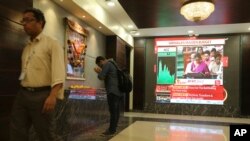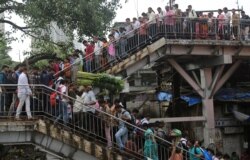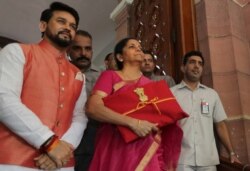Since being laid off from a garment factory when it downsized two months ago, 35-year-old Shrawan Kumar Mandal has been making daily visits to a hub of small manufacturing units in Gurugram on the outskirts of New Delhi.
“I spend the whole day going from place to place but I am just not getting a break,” says Mandal. “It has never been so hard to land a job in the last six years. I don’t know what has happened.”
He is among tens of thousands of people who have lost jobs as exports slump, automobile sales plummet and several sectors like real estate experience a downturn. Financial experts say the issue is not whether India’s economy is sliding but the severity of the crisis.
The latest numbers paint a gloomy picture. Growth tumbled to 5 percent from April to June – the lowest in six years.
It is a huge contrast from the promises of an economic resurgence made by Prime Minister Narendra Modi when he emerged onto India’s political stage in 2014. But barely four months into his second term after winning reelection in May, the worrying data has caused alarm.
“The slowdown is much deeper than what many analysts think,” according to economist N.R. Bhanumurthy at the National Institute of Public Finance and Policy, whose warnings of a slump last year were largely shrugged off. “The government seems to have to now understand that there are issues, although they don’t openly or officially agree there is a slowdown.”
It is a reality check for a country that until last year was the world’s fastest growing economy.
Much of the shock waves have come from the automobile industry, that along with ancillary units, provides direct and indirect employment to some 35 million people and is the mainstay of India’s manufacturing industry.
Sales of passenger cars have been at their steepest decline in two decades – in August sales fell by more than 30 percent. That has prompted the biggest automakers to briefly shut down factories in the last two months as stocks pile up. The production cuts have threatened the jobs of thousands of contract workers.
Meanwhile, a lingering downturn in the housing sector has hit tens of thousands of middle class people who invested in residential projects that were never completed by property developers.
Ashish Tiwari, a private sector employee, is among them. Since 2015, he has been paying approximately $350 every month to bring down a bank loan he took out to buy an apartment on the outskirts of New Delhi. It is among an estimated 450,000 residential units through the country were left incomplete in recent years. “It is an additional financial burden on me,” he says. “I am paying Rs. 25,000 (close to $350) with no hope, no hope.”
The housing projects were stalled due to several reasons – many property developers ran out of money following Modi’s 2015 decision to scrap 80 percent of India’s currency overnight. Additionally, it became tougher to raise credit from banks hit by bad loans.
The impact of the slump is spreading to markets and shopping malls. Even though the country’s main festive season is just weeks away, shop owners say consumers are not opening their wallets. Pay raises and bonuses have been meager and employees are worried about retaining jobs while the pinch of repaying loans for unfinished projects leaves many like Tiwari with less disposable income. Others, like Shrawan Kumar Mandal, whose household now depends on the odd jobs he gets and his wife’s income, have to cut back even on food rations.
The consumption slowdown was highlighted when leading snack making companies recently noted that even sales of their cheapest biscuits priced at 7 cents had been hit. “The real wages have actually not grown for the last three to four years which actually is putting pressure on household budgets,” says economist Bhanumurhty.
That is a huge setback for a country whose economy is largely fueled by domestic demand from the country’s 1.3 billion people.
“I have a job but I am always worried, God knows 'til when,” says Ram Kumar Sharma, an employee with PhonePe, an app that allows users to make payments on a mobile phone. On a hot afternoon, he was helping a roadside vendor to make the switch to digital payments.
After months of denying that the economy was in trouble, the government is trying to turn it around. In recent weeks, Finance Minister Nirmala Sitharaman has held an unprecedented three press conferences to announce a raft of measures to give it a boost. These include a fund to complete stalled middle income housing projects and easier credit for exporters. The government is also promising to spend more on infrastructure projects.
But many economists fear that these steps may not be sufficient to turn around the economy anytime soon and are questioning whether Prime Minister Modi’s ambitious target of making India a $5 trillion economy by 2025 is achievable. Commentators are calling for stronger action. “Modi has to show the same audacity and courage on the economic front as he has in politics,” the magazine India Today noted.
And although the nationalist leader, who won a huge victory in May, still commands popular support, the news of the slipping economy has begun creating disenchantment. “I don’t think I got any benefit from the Modi government. I am the biggest loser,” said disillusioned Tiwari, as he paid out the latest monthly loan installment for a home he never saw.












